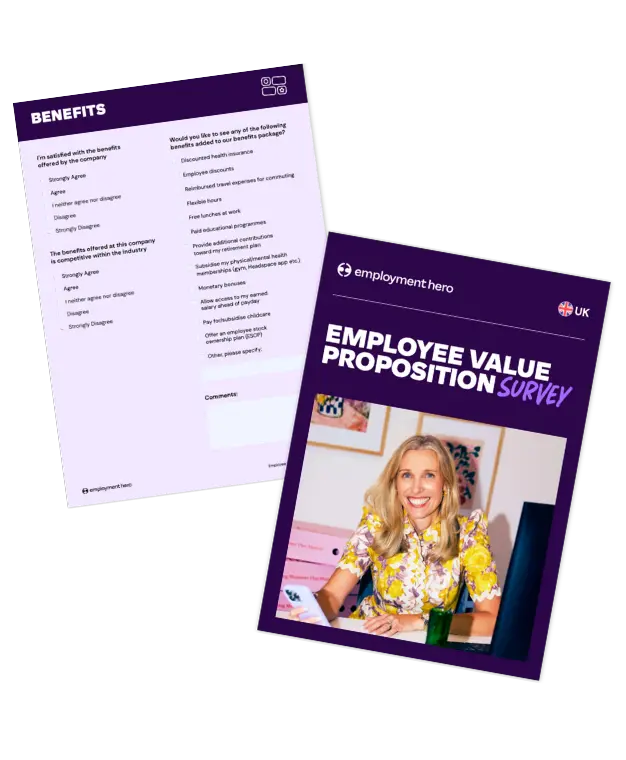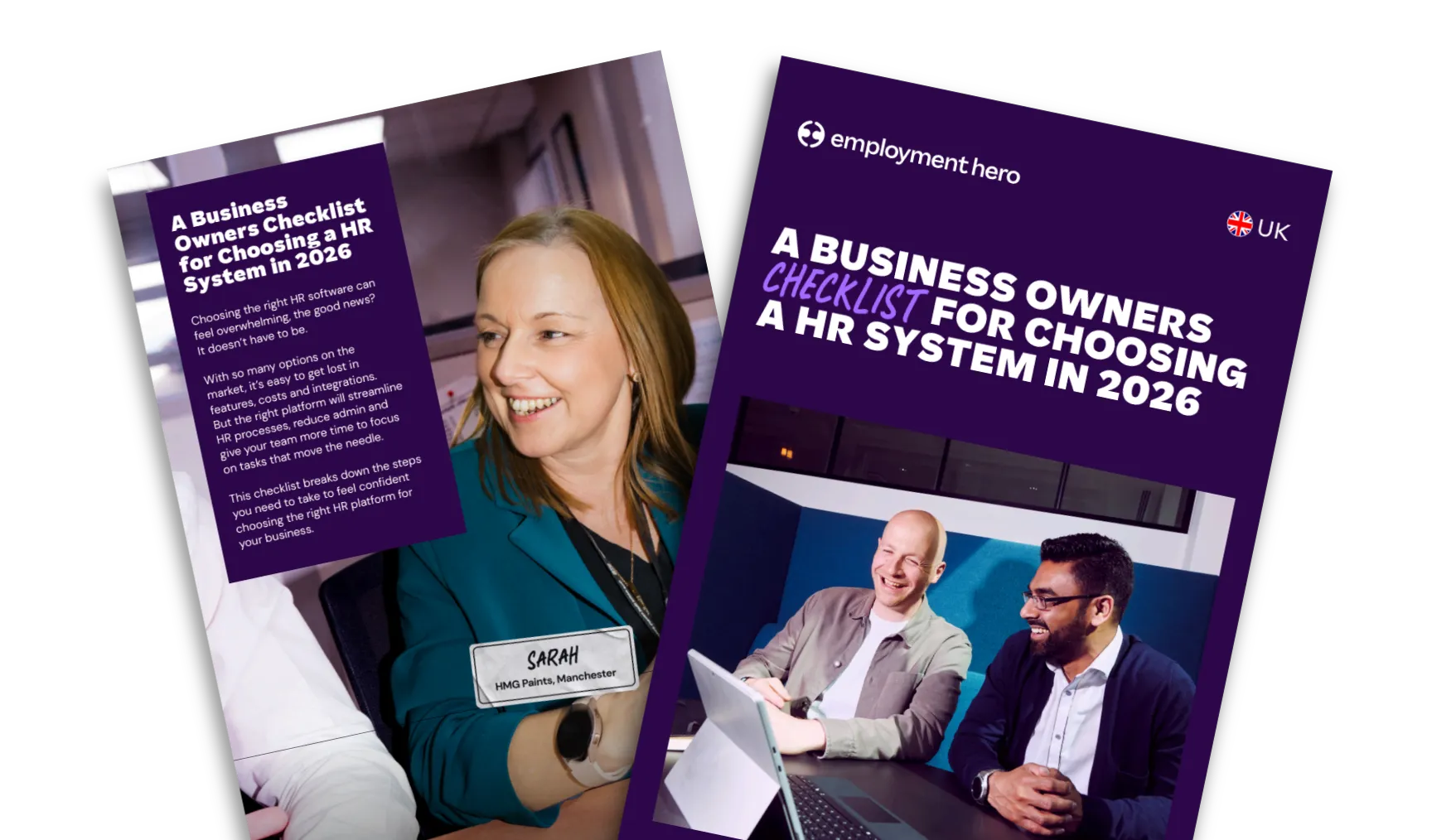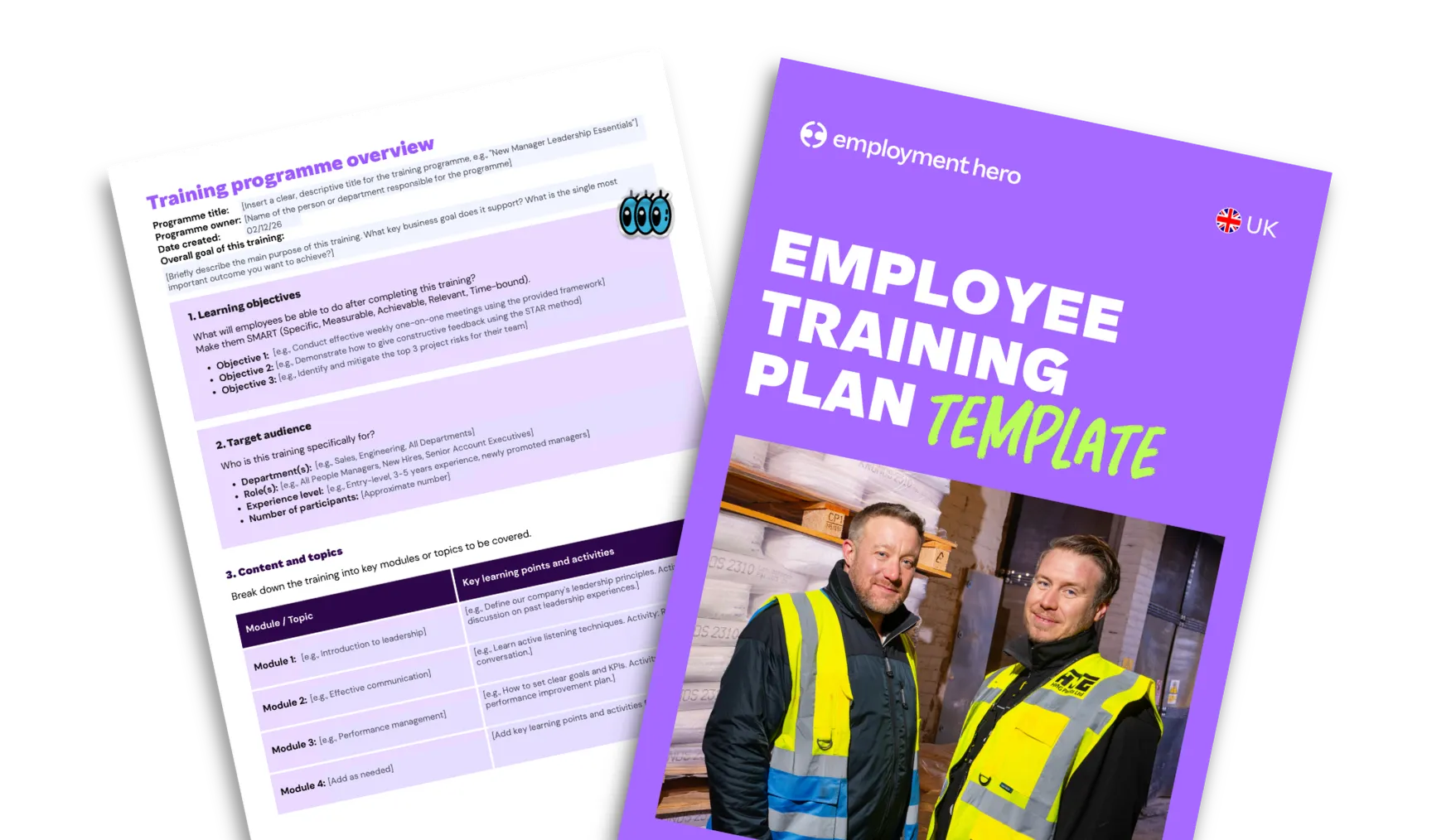Employee value proposition survey: Questions and template
Published
Employee value proposition survey: Questions and template
Fight employee turnover and gain essential insights with these employee value proposition survey questions. Staff turnover is one of the biggest concerns for any business, so knowing how they rate your EVP is absolutely vital. No matter what you offer new and existing team members, there’s always room for improvement.
Our free downloadable survey template provides you with carefully crafted questions to gain the most valuable insights, helping you understand how your employees feel about things like:
- Alignment with company culture
- Motivation and engagement
- Salary and benefits
- Career development and opportunities
Your employees are the ones who most understand your business, and are best placed to give you ideas on how your EVP can be optimised to retain staff and attract new talent.
To download the survey, fill in the form on the right.

What are employee value proposition (EVP) surveys?
Your employee value proposition essentially sums up what makes your business a great place to work. It includes everything from pay and benefits to work environment, career opportunities and company culture.
EVP surveys are designed to be sent out to employees of a company to find out how they feel about the current EVP and what they would like to see improved – whether that’s particular benefits, a stronger work culture or better learning opportunities. All the things that make a business a good (or bad) place to work are included in the employee value proposition. An EVP survey is an opportunity for an employer to find out what’s working and what isn’t, with the goal of improving wherever possible.
Running an EVP survey has a host of benefits, including:
- Improving recruitment to attract the best talent
- Keeping salaries and benefits competitive
- Boosting employee engagement
- Spotting potential problems before they emerge
- Finding out what employees love most about your business
The importance of delivering a solid EVP can’t be overstated. Research by Gartner shows that implementing a strong EVP can decrease annual employee turnover by 69%. Replacing an employee role can cost more than the annual salary of the role itself, so higher retention can make all the difference in the world to a business’s bottom line.
How can employee value proposition surveys help your business?
As an employer and people leader, you should always be making time for feedback. Not soliciting feedback can leave you unaware of pressing issues, and before you know it, you could see your employee happiness and retention plummet.
We know, it’s not always easy to be told the harsh truths. However, the most effective leaders are the ones who look for feedback, who take it on board in good faith, and who act on it too. In turn, they show a commitment to their team and respect for their opinions.
The employee value proposition is just one of several business areas that employers should be regularly looking for feedback on. It’s particularly important when it comes to building a strong workplace culture and employer brand, as an EVP directly affects how your employees feel about your business and whether they continue working for you. If you’re open to feedback about where and how your EVP could be improved, you could see some fantastic outcomes for your business.
For a comprehensive approach to improving engagement, check out our Ultimate Employee Engagement Guide. It offers valuable insights into the link between engaging employees and organisational performance.
Examples of employee value proposition survey questions
There are lots of different ways you can frame an employee value proposition survey, but if you’re not sure where to start, download our pre-made survey. It’s available by filling in the form on this page.
If you want to build your own survey from scratch, here are some areas and example questions to give you inspiration:
Culture and engagement
This encompasses a business’s policies, work environment and culture, delving into how engaged employees feel with the company’s direction and ethos.
- On a scale of 1 to 10, how motivated are you to come to work every day?
- Are you clear about the company’s goals and how your work contributes to achieving them?
- What aspects of your work environment do you feel could be improved?
- Do you feel comfortable expressing your opinions and ideas in team meetings and discussions?
- How likely are you to recommend the company as a great place to work to friends or acquaintances?
Compensation and benefits
Though it can be an awkward subject, pay is the most important aspect of EVP for many people. This area also includes any perks and benefits, often a deciding factor for attracting new talent.
- Do you feel that your compensation is competitive compared to others in similar roles in the industry?
- Do you feel that the company recognises and rewards employees who perform well?
- How satisfied are you with the benefits provided by the company, e.g. health insurance, subsidised lunches and additional leave?
- Are there any benefits you would like that aren’t currently offered by the business?
Career growth
Roles that provide personal development and career opportunities are increasingly important. Supporting your employees’ career growth should always be a priority, showcasing your commitment to their future.
- How satisfied are you with the opportunities for professional growth and development provided by the company?
- How often do you receive feedback on your performance, and do you find it helpful for your growth?
- Do you feel that your job allows you to utilise your skills and abilities to the fullest extent?
- Is there specific training you feel you need in order to better perform your role?
Leadership and trust
Do your employees trust their leaders? Feeling confident in managers and decision makers can be a big factor in overall employee satisfaction, making it a vital subject to include in your EVP survey.
- How well do you believe your manager supports your work and helps you succeed?
- How supported do you feel in times of personal or professional challenges by your colleagues and managers?
- Do you feel that the company listens to and acts upon employee feedback and suggestions?
- Do you feel a sense of belonging and camaraderie with your team members?
- Would you say that communication channels within the organisation are effective?
- How would you rate the level of trust and transparency within the organisation?
Work-life balance
Balancing work life with home life is critical to employee wellbeing. This balance is impacted by many different company practices and policies, demonstrating how a business treats its employees and respects their time.
- How satisfied are you with the work-life balance provided by the company?
- How would you rate the level of stress in your work environment?
- Do you feel that your workload is manageable and achievable in during your normal working hours?
- Do you feel you’re able to switch off from work, not answer emails etc, outside of your working hours?
- Are you satisfied with the available options for flexible hours / remoting working / hybrid working etc?
Diversity and inclusion
Being confident to be yourself at work and feeling included and respected are a vital part of the employee experience. Having an inclusive and diverse workplace greatly affects recruitment and staff turnover, so it’s an important area to cover.
- Do you feel that your workplace celebrates and values diversity?
- How satisfied are you with the level of diversity and inclusion in the workplace?
- Do you feel comfortable being your authentic self at work?
- Are there ways you feel the company could be more inclusive?
How to design and run your EVP survey effectively
Once you’re ready to create your EVP survey and find out what employees really think, you’ll want to make sure it will be effective. The aim is to get valuable feedback from across your organisation, finding out what’s working or not working in your current EVP.
Here are some important factors to consider:
- How often? In general, an annual EVP survey is a good idea. You don’t want to overload employees asking for feedback, but you also don’t want to leave it too long between surveys.
- How long? Asking too many questions in your EVP survey can lead to fatigue as your employees answer it, which could mean less accurate or incomplete results. Ideally, make sure your survey can be completed in under 10 minutes.
- Who should you ask? EVP surveys should be anonymous, as this gives employees the freedom to be honest. However, it can be useful to identify what team a person works in, as this can reveal departmental problems.
- How should you ask? It’s important to make it as easy as possible for employees to answer your survey, such as with employee engagement software. Alternatively, you could use an online survey tool.
What to do with your EVP survey results
Now you’ve crafted the perfect EVP survey and successfully rolled it out across the business, what do you do with the answers?
- Analyse the results. This takes time, but go through the answers to collate ratings and review the open-ended responses.
- Identify key themes. Find the big stories in the results. What are people most dissatisfied with? What do people love? What represents the biggest challenges and top priorities for change?
- Communicate your findings. Present the data and themes in the clearest way possible, whether communicating to leadership or back to the company in general.
- Take action. The biggest challenge of the process is using it to make change, but that’s the purpose of the survey. If areas of the EVP need improving, it’s time to take action.
- Repeat. Things change in every business and industry, so plan to do it all again next year and every year to monitor the effectiveness of your EVP.
EVP FAQs
This depends on the size of your company and if you’re making big changes, but in general, it’s worth doing annual EVP surveys.
Consider using a mix of ratings and open questions to get a good mix of results. Ratings from 1-10 can be helpful to get quantifiable data, while open questions provide more specific information and detail.
For a company-wide EVP, you should be aiming for 70% and above. If response rates drop, this could be a sign that they’re too frequent or too long.
Identify the key themes in the responses and see what’s causing people to be dissatisfied with their roles. You should also do exit interviews with leavers to gather information on why they left and what could have encouraged them to stay.
Register for the survey
Related Resources
-
 Read more: EOFY HR Audit: What to Review in March
Read more: EOFY HR Audit: What to Review in MarchEOFY HR Audit: What to Review in March
Complete a EOFY HR audit with our practical checklist. Review compliance, people processes and compliance to reduce risk before the…
-
 Read more: How to Choose an HR System: A 2026 Buyer’s Checklist
Read more: How to Choose an HR System: A 2026 Buyer’s ChecklistHow to Choose an HR System: A 2026 Buyer’s Checklist
HR software is more than features. Discover how the right system can streamline operations, boost efficiency and future-proof workforce management.
-
 Read more: How to Create an Employee Training Plan: Template & Guide
Read more: How to Create an Employee Training Plan: Template & GuideHow to Create an Employee Training Plan: Template & Guide
Ready to build a training program that drives results? Learn how to create an effective employee training outline that aligns…



















